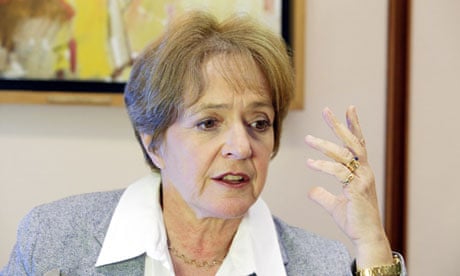Repeated claims by ministers that the NHS made almost £6bn of productivity gains last year have been questioned by the public spending watchdog, which suggested that savings had been much smaller.
The National Audit Office (NAO) said it could only verify £3.4bn of the £5.8bn efficiency savings supposedly achieved by the NHS in England in 2011-12 as part of a drive to save up to £20bn by 2015.
It is sceptical that the £5.8bn of savings trumpeted by the Department of Health (DH), including from freezing staff pay and cutting the fees hospitals receive for treating patients, were realised. "There is limited assurance that all the reported savings were achieved," the watchdog says in a new report on Thursday into how well the NHS is delivering the "Nicholson challenge" for unprecedented efficiencies.
Instigated by the last government and named after the NHS chief executive, Sir David Nicholson, it requires every part of the service to make efficiency gains of up to £20bn between them by the 2015 general election.
Ministers have maintained that the NHS made £5.8bn of the £5.9bn savings expected in 2011-12, the first year of the savings drive. However, the NAO takes the DH to task for not doing more to check that NHS organisations' claimed savings actually occured. It has no way of knowing if NHS primary care trusts' claims about savings are true because it "does not validate or gain independent assurance about the data provided", the NAO says.
It had received "assurance" that another £600m of the £5.8bn total was genuinely saved by the DH, arms length bodies and strategic health authorities, but qualified that by adding that that figure did not take account of the "at least" £400m cost of making thousands of staff redundant in order to generate the £600m saving.
In addition, while savings made under the Nicholson Challenge are meant to be recurrent, £520m of the £5.8bn alleged savings were non-recurrent, and so "the NHS will have to find replacement savings in future years", the watchdog adds.
Margaret Hodge MP, who chairs the Commons public accounts committee, which oversees the NAO, said that while the £5.8bn "sounds like welcome progress, over 30% of these savings lack any kind of independent assurance to provide parliament and the public with confidence that they present a true picture".
The NAO also warns that the NHS is facing three years of increasingly tough decisions over how it treats patients in order to realise the £20bn of savings.
The service has until now made "the easiest savings first", such as by freezing staff pay for two years, cutting "tariff" payments to hospitals by 4% in real terms, using fewer temporary staff and back-office economies, it says.
But NHS managers will find it increasingly hard to find further savings unless they overhaul how they care for patients and keep more people out of hospital, the NAO says.
The NAO echoes the view of many NHS leaders, doctors organisations and patient groups that many more patients need to be treated outside hospitals, in community health settings, so the service can square rising demand caused by the ageing population, advances in medicine and the growing number of people suffering with long-term conditions such as diabetes or dementia with years of flat budgets.
But doing that is controversial, because it leads to the viability of hospital units, or even entire hospitals, coming under threat, and is usually accompanied by local campaigns against such plans.
The watchdog casts doubt on the NHS's ability to undertake the scale of innovation needed. "It will be increasingly difficult for the NHS to generate new efficiency savings in future years. Service transformation is key to making future savings, but only limited action has been taken to date," its report notes.
Hodge said: "The low-hanging fruit – the easiest savings – have already been harvested. The NHS will have to search deeper and wider for future efficiency savings. Fundamental service transformation is vital to unlocking savings, but progress to date is underwhelming."
The British Medical Association warned that patients might be denied access to some treatments as the NHS looks to find further savings. "We would question whether the NHS can continue to cut costs so rapidly while maintaining current levels of quality and without reducing the current offer to patients," said a spokesman.
The watchdog is also concerned that rationing is already being used, by "inappropriately restricting patients' access to care", to save money through the increased use of "demand management" measures intended to reduce the number of patients referred to hospital. The NHS risks "shutting the door to patients", said Hodge, who added that she was astonished that the DH had no way of knowing if rationing was occuring.
Lord Howe, the health minister, welcomed the NAO's judgment that overall the NHS was doing well to meet its efficiency target.
"However, if it is to meet the needs of an ageing population, it needs to seriously look at how it can improve how care is being provided, particularly to older patients and those with long-term conditions," he said. It had to make the productivity gains in order to free up resources to cope with the challenges associated with more elderly people having complex conditions, he said.

Comments (…)
Sign in or create your Guardian account to join the discussion